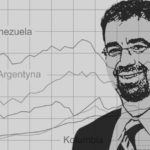Daron Acemoglu earns the Frontiers of Knowledge award for proving the influence of institutions over economic development
The BBVA Foundation has distinguished Turkish economist Daron Acemoglu with its Frontiers of Knowledge award. A professor at the Massachusetts Institute of Technology (MIT), Acemoglu was the first economist to prove that there are institutions that generate prosperity and others that hinder development.

In the words of the jury of the Frontiers of Knowledge Award in Economy, Acemoglu’s work has been influential not only in economics, but also in political science, history, and social sciences more broadly. His research has opened up a whole new field where researchers can measure and quantify the impact of the institutional model on a society’s development at different scales.
Acemoglu employs a broad definition of institution, extending to “all the formal and informal rules that govern human interaction,” from labor legislation to property and contract rights (legal certainty), by way of transaction costs, infrastructures or the education system as a means to spread out opportunity.
Acemoglu distinguishes between inclusive and extractive institutions. Inclusive institutions provide incentives for investment and innovation and they provide a level playing field so that the majority of a nation’s population can deploy their talent. These economic institutions generate prosperity.
But most societies are ruled by extractive institutions, which create insecure property rights, don’t allow contracts, discourage innovation and technology adoption, and most importantly, create a very tilted playing field, advantaging a small segment of society, and sometimes even coercing people to work at low wages in occupations they shouldn’t be in, and banning them from occupations they wish to enter.”
"We have found no other way of ensuring long-run prosperity for a nation than striving towards achieving inclusive institutions
On the question of how a society can get from an extractive to an inclusive institutional framework, Acemoglu says that “there is no easy way, but summarizing our research briefly, we have also found no other way of ensuring long-run prosperity for a nation than striving towards achieving inclusive institutions.”
It is possible for an economy in the grip of extractive institutions to experience vigorous growth for a time, but “long-run, sustained economic growth needs technological change, innovation and creativity, and all those things flourish under inclusive economic institutions.”
Economy of Growth
Growth economics explores the question of why some countries are richer than others. A research field brought to prominence from the 1950s onwards by the work of Robert Solow, the 1987 Nobel Laureate and one of Acemoglu’s nominators.
However, until Daron Acemoglu – in collaboration with Simon Johnson and James Robinson – published in 2009 a paper entitled Introduction to Modern Economic Growth, there was a lack of consensus over the determinants of growth, and a dearth of empirical evidence to support the contesting theories.
The paper produced empirical evidence of institutions’ causal role in economic growth. Their evidentiary starting point was settler mortality: In colonies with a greater chance of survival, settlers sought to replicate the governance institutions of their home countries, and this eventually set their economies on a trajectory of stronger, more sustained growth. For instance, comparing Nigeria and Chile in 1995, they concluded that with institutions similar to Chile’s, the income of Nigeria would have increased seven fold.
The jury also makes mention of Acemoglu’s incisive analyses of labor market differences, He has recently been drawn to analysis of the linkage between new technologies and the economy, with particular regard to network interactions.